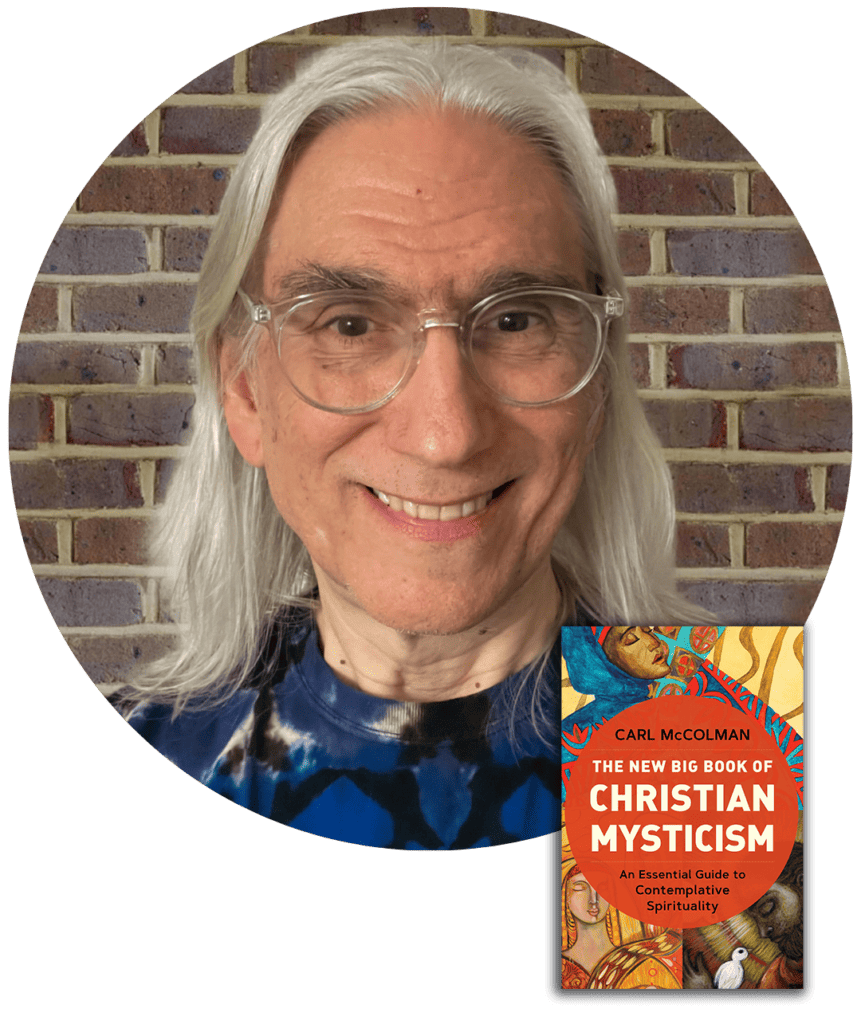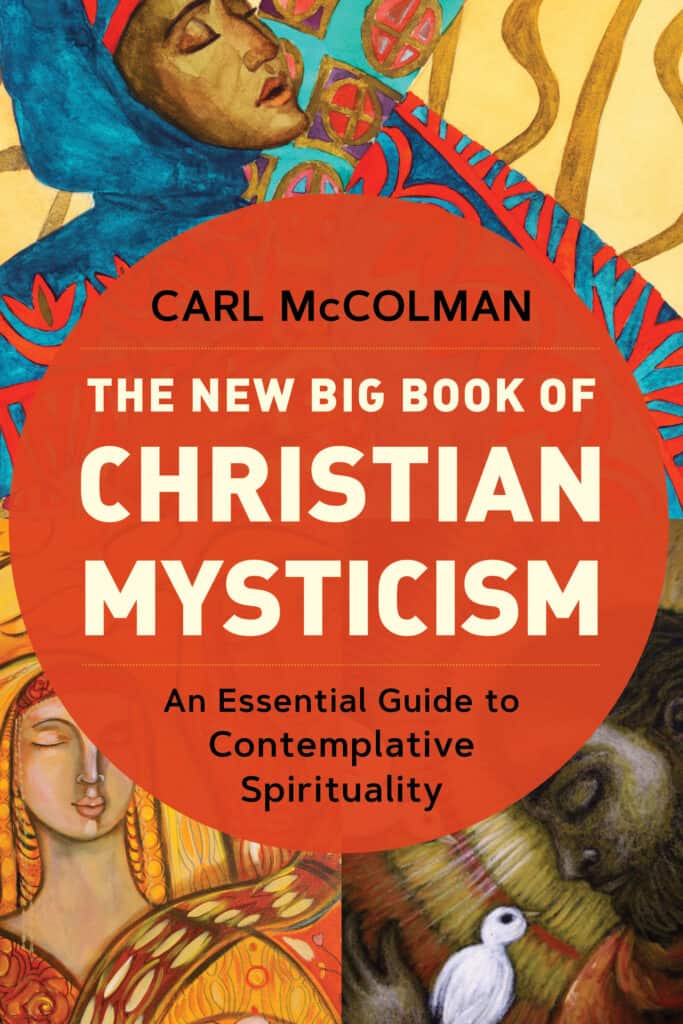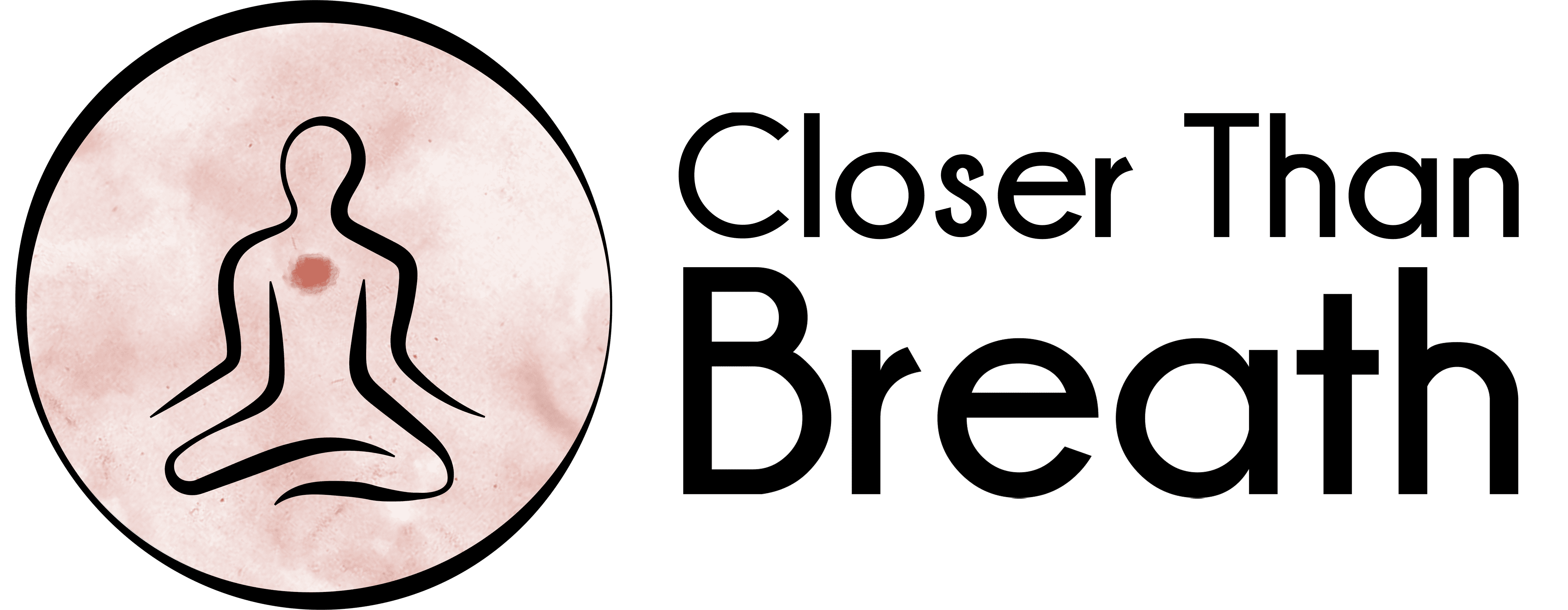I’m very happy to share a new Author Interview with Carl McColman, author of The New Big Book of Christian Mysticism: An Essential Guide to Contemplative Spirituality.

Enjoy the email interview below!
Question 1
Why does Christian mysticism matter?

Let’s begin with a brief word about what Christian mysticism is. The concept of mysticism is related to a Greek word for mystery and for silence (the same root word that gave us “mute”). So mysticism is a deep expression of spirituality that values silence, unknowing, wonder, and love — qualities that, for mystics, are far more important than the characteristics often associated with Christianity, such as dogmatism, narrow moralism, and an institutional culture that stresses obedience and conformity. Christian mysticism is a liberating spirituality that offers a holistic alternative to the toxic traits too often found in mainstream religion.
Karl Rahner, a renowned German theologian who died about 40 years ago, once said “The Christian of the future will be a mystic or will not exist.” In just a few decades’ time, it’s obvious how prescient these words are. In its institutional form, Christianity today is in crisis. Churches across America and Europe are closing, or simply limping along with a dwindling, aging membership. In America, too many people see Christianity as having lost its moral authority because of how so many churches have become linked to a very narrow political agenda. We live in a consumer society, and I cannot blame people who wonder if Christianity, in its institutional form, has just become a kind of “brand name spirituality” that with each passing year seems to appeal to less and less people. In the language of business, Christianity as a brand is losing market share, and losing it rapidly.
Back to Karl Rahner. His words are a challenge but also an invitation, both to Christians and to people who have given up on the institutional church but who still value spirituality. Imagine if we could separate out the spiritual (read: mystical) wisdom at the heart of the Christian tradition, and consider how that wisdom remains relevant to our day, even if the institutional church were eventually to disappear. That’s why Christian mysticism matters: it keeps the wisdom teachings of Jesus and his most spiritually creative followers alive and accessible to us today — regardless of what may happen to the “organized religion” aspect of Christianity.

Question 2
Who is this book for?
Anyone who’s interested in the topic, of course — but this is not a dry-as-dust academic study of mysticism, but rather a book meant for exploring how mysticism is a living wisdom tradition that continues to be relevant and meaningful in peoples’ lives. I see two kinds of people who might really enjoy reading The New Big Book of Christian Mysticism.
Anyone who is interested in spirituality or mysticism will find a lot to ponder here, even if you are not a Christian or a church-goer. There’s a level on which mysticism is a universal expression of spirituality, and people who identity as spiritual-but-not-religious, or as Jewish or Buddhist or whatever, will find ideas and insights in the Christian mystical tradition that resonate with the deep spirituality of their own path.
As Psalm 42 says, “deep calls to deep”! So if you are interested in meditation, contemplation, silent spirituality, and really any type of experiential inner development, I think you’ll love this book. I know many people are wary of Christianity because of how so many Christians are pushy about their religion, but that’s not where this book is coming from at all. I respect all wisdom traditions, and tried to keep that sense of respect front and center in this book.
But the other category of readers includes people who identify as Christians but maybe are not aware of the deep mystical heritage in the Christian tradition. In the book I say that mysticism is “Christianity’s best kept secret” (and I try to explain why this is so). So many Christians are struggling with their faith, and I believe for many of them, the positive, intimate path of mystical spirituality might be a wonderful way to find a meaningful path forward as a lover of Jesus and his wisdom teachings.
Question 3
So this is a revised edition of a book published previously. How is it different?

The New Big Book of Christian Mysticism is not only revised, but greatly expanded — 40,000 words longer than the first edition, which means almost 100 pages of new material. So even if you’ve read the old edition, this version has plenty of new ideas and information for you to reflect on. There are five new chapters, covering Jesus, the social dimension of mysticism, the erotic dimension of mysticism (yes, that’s a real topic, I didn’t just make it up!), the importance of the body in contemplative practice, and an overview of the different types of spiritual and contemplative practices that are associated with mysticism.
Meanwhile, all the other chapters have been carefully revised, often expanded and rewritten to make the material more clear and accessible. I’ve worked hard to make this a more inclusive book — there is a Eurocentric bias in the history of mystical Christianity, but today many of the most exciting mystics come from other places around the world, like Anthony de Mello from India, or Howard Thurman from America. And while Christian mysticism has always been more inclusive of women than many other aspects of Christian culture, in this edition I’ve tried to be more careful to amplify the voices of women mystics whether famous like Teresa of Ávila, or lesser known like Pauli Murray or Caryll Houselander.
Finally, I’ve really kept in mind the trends I’ve talked about above — that so many people have let go of Christianity-as-institution, even while they remain interested in the spiritual teachings. So I’ve worked to make sure the book is welcoming and inclusive for all readers.

Question 4
What advice do you have for someone curious about mysticism?
Naturally, I hope everyone who is interested in mysticism will read this book! But let me also say, rather paradoxically, that mysticism is not something that can be found just in a book. Yes, read this book, and go on to read the writings of great mystics like Evelyn Underhill or Julian of Norwich or Meister Eckhart. But to really embrace the mystical life, the time must come when you put down whatever book you’re reading and sink into the silence that can be found within, between every heartbeat and beneath every thought that flows in the stream of consciousness.
Mysticism is about the encounter with the Divine Mystery (traditionally called “God”) and exploring how that sacred encounter can transform and enlighten our ordinary lives. So take time to pray, to meditate, to contemplate, to wonder, and to access the love and hope that is already available to you in your heart.
Psalm 46 suggests that the key to knowing God is stillness, and Psalm 62 affirms the beauty of waiting for God in silence. So silence and stillness can be meaningful ways to encounter the Divine Presence. Finally, remember that the only time in the Bible that God is ever defined comes in the first Letter of John which bluntly states “God is Love.” So if you want to cultivate mystical spirituality in your life, calibrate your heart to receive and pour out that Divine Love.
About Carl McColman

Carl McColman is a contemplative writer, speaker, teacher, soul friend, and storyteller. He is the author of numerous books on mystical, contemplative and Celtic spirituality. Carl is a Lay Cistercian, meaning he has studied formally with Trappist monks, and is a commissioned presenter of Centering Prayer workshops. He blogs on mystical spirituality and contemplative living at www.anamchara.com. Carl lives with his wife and several highly-pampered cats near Atlanta.


